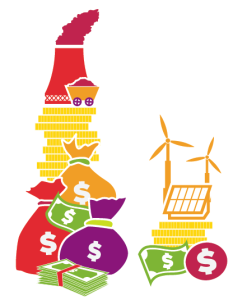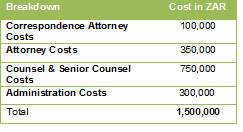SAFCEI legal response to SA secret nuclear deals
- Published:
 South Africa's government is poised to commence procurement of up to eight nuclear reactors at a cost of at least R500 billion (more likely R1 trillion, dwarfing the cost of the notorious Arms Deal), excluding the costs of overruns, finance, nuclear waste treatment and decommissioning, and without having established a transparent, Constitutionally compliant procurement process for nuclear procurement that includes public participation.
South Africa's government is poised to commence procurement of up to eight nuclear reactors at a cost of at least R500 billion (more likely R1 trillion, dwarfing the cost of the notorious Arms Deal), excluding the costs of overruns, finance, nuclear waste treatment and decommissioning, and without having established a transparent, Constitutionally compliant procurement process for nuclear procurement that includes public participation.
Government has refused to take the public into its confidence regarding affordability of a nuclear fleet, and there are significant concerns about long-term negative impacts on electricity prices and on the public as taxpayers, as well as with regard to the rationality of locking South Africa into a long-term contract to build eight nuclear power plants. This is at a time when innovation in renewable energy technologies is gaining momentum and the price of renewable energy production is falling.
All this is taking place after the Department of Energy released a draft update to the Integrated Resource Plan in 2013 which stated that a fleet of nuclear reactors was no longer necessarily desirable given the reduction in energy demand in the three years after the IRP 2010 was promulgated. In 2008 Eskom abandoned a tender for two nuclear reactors because they were seen as unaffordable and nothing has been shown by government to have changed since then.
International agreements on nuclear cooperation have already been signed with vendor countries and have been tabled in parliament using a procedure that does not require parliamentary ratification. The Russian agreement in particular has significant implications for South Africa regarding nuclear liability in the event of a nuclear incident (among other things).
SAFCEI is concerned that the speed and secrecy with which the procurement is being pursued raises the risk of potential corruption and/or irregular and irrational expenditure on an unprecedented scale. SAFCEI’s lawyers are engaging with the Minister of Energy, but (depending on the response received, if any) in the interim are gearing up to launch a High Court application aimed at ensuring that the procurement of nuclear power plants does not occur in a corrupt or otherwise unlawful fashion.
 SAFCEI, in partnership with Environmental organisation, Earthlife Africa Johannesburg, has briefed our legal team and is asking for everyone’s help. We need to raise R1.5 million rand to prepare and run this court case. We are looking to donors both international and local, and because government is rushing to sign procurement deals, we need to raise the money now. We ask for your contributions – the smallest donations are welcome. Every rand counts.
SAFCEI, in partnership with Environmental organisation, Earthlife Africa Johannesburg, has briefed our legal team and is asking for everyone’s help. We need to raise R1.5 million rand to prepare and run this court case. We are looking to donors both international and local, and because government is rushing to sign procurement deals, we need to raise the money now. We ask for your contributions – the smallest donations are welcome. Every rand counts.
For more information contact SAFCEI's 'Ethical Governance' Programme Coordinator, Liz McDaid: liz@safcei.org.za
ODAC
SAFCEI has briefed ODAC to assist with the PAIA request.
ODAC’s mission is to promote open and transparent democracy; foster a culture of corporate and government accountability; and assist people in South Africa to be able to realise their human rights. By promoting transparency, enhancing access to information, supporting whistleblowers and liberating data, we are forwarding a culture of accountability and openness to meet the needs of citizens.
Adrian Pole Environmental Justice Attorney
SAFCEI has briefed environmental justice attorney Adrian Pole to provide advice on the nuclear procurement process and associated environmental impacts. Adrian Pole Environmental Law provides legal support to green and environmental justice NGOs / CBOs; and promotes sound governance and fair, informed environmental decision-making.
Further background information:
SAFCEI has appointed legal counsel to write to the Ministers of Finance (sent 10th February 2015), Public Enterprises (10th February 2015) and Energy (sent 30th January 2015) to ask for confirmation that any nuclear procurement would comply with due process.
At a board meeting in October 2014, SAFCEI elected to seek legal counsel to investigate the nuclear contracts which South Africa had signed. Faith communities are gravely concerned at the government’s continued support for nuclear energy despite evidence that South Africa cannot afford it.
In November 2014, SAFCEI submitted a number of PAIA applications to government departments regarding the nuclear framework agreements, departments including Treasury and the Department of Energy.
For Example, SAFCEI asked Treasury for all “Records reflecting decisions taken related to the financial obligations and the economic impact of the decisions reflected in intergovernmental agreements on current strategic partnerships and cooperation in nuclear energy” in terms of the Promotion of Access to Information Act (PAIA).
In its response to SAFCEI, the treasury admitted that they had not given any input into the financial implications of any nuclear deals, and SAFCEI voiced its concern that the “South Africa nation has entered into an international agreement without doing their financial homework”.
The Department of Energy (DoE) has also responded to the Southern African Faith Communities’ Environment Institute’s (SAFCEI) application for information regarding the nuclear deals.
The DoE has refused to release any affordability or feasibility study because the process of deciding on the nuclear build involves “technical, scientific and commercially sensitive information and if released prematurely could prejudice the interests of the other parties, as well as the State and negatively impact on the process”. However, SAFCEI’s response from Treasury to a similar request regarding the nuclear deals was that “no decisions related to the financial obligations and economic impact have been taken by the National Treasury.”
The process to determine whether South Africa should build new nuclear capacity should be determined by South Africans and open to public scrutiny; firstly on the constitutional principle of democratic participation by the people of the country in decisions that affect them, and secondly because such a decision would impact negatively on the electricity price, which would have a major impact on business growth and on energy security for the poor.
Who we are

SAFCEI (Southern African Faith Communities’ Environment Institute) is a multi-faith organisation committed to supporting faith leaders and their communities in Southern Africa to increase awareness, understanding and action on eco-justice, sustainable living and climate change.
Featured Articles
-

South Africa: Who Ends Up Paying If DMRE Cooks the Price of Nuclear Power?
-

South Africa’s nuclear energy expansion plans continue to draw criticism, environmental NGOs chew over legal challenge
-

Earthlife Africa and SAFCEI respond to latest unsettling nuclear news regarding the ministerial determination
-

Open Wing Alliance Africa (Virtual) Summit 2023
-

The Green Connection and SAFCEI respond to energy minister's divisive and deflecting comments
-

Job Vacancy: FLEAT Coordinator







